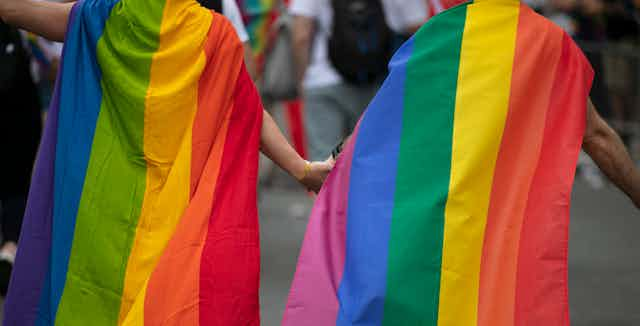About 40 years ago, a man named George was arrested in Earl’s Court, London, and charged with persistent importuning. His offence? Striking up a conversation with another man who then invited George back to his flat, only to reveal that he was a police officer. George would later plead guilty and be fined £100 (roughly £350 today), after feeling pressured by the police following his arrest.
For gay and bisexual men in the years following the partial decriminalisation of homosexuality, this experience was not uncommon. George’s case is one of many listed in the first annual report of the Gay London Police Monitoring Group in 1984. Several of these involved police officers arresting gay and bisexual men after they exited bars at closing time.
Importuning, which effectively criminalised a man from making an advance on another man in public, is one of several offences that the UK government may now move to pardon. The recently announced reforms to expand the pardoning of historic homosexual offences are to be brought forward as an amendment to the government’s Police, Crime, Sentencing and Courts Bill. Other aspects of the bill have attracted controversy over their impact on human rights.
The existing pardoning scheme, known as the Turing Law, was introduced in 2016 following the 2013 posthumous royal pardon for second world war code breaker Alan Turing. Under the current process, applications for past convictions to be disregarded can only be made in respect of a limited range of offences.
Importuning is not included among these. The offence remained on the statute books until 2003, long after the partial decriminalisation of homosexuality in England and Wales in 1967. This reflects the fact that decriminalisation only extended to consensual behaviour occurring in private. This was a recommendation of the government-commissioned Wolfenden report. This report, along with numerous campaigns led by those who were criminalised and persecuted, was instrumental in changing the law.

In 2021, a proposed amendment in the House of Lords sought to extend the pardon scheme to all offences that “regulated, or [were] used in practice to regulate, sexual activity between persons of the same sex”, which had subsequently been repealed. This amendment was withdrawn after the government committed to return to the issue as the policing bill progressed, but the new announcement appears similar to last year’s proposals.
Who is left out
If the scheme is broadened in this way, including cases such as George’s involving importuning, pardons may become available for many who were denied one when the process was first introduced. The new scheme will not, however, cover behaviour that is capable of being prosecuted under current criminal law. This may, for instance, exclude some arrested in public lavatories, who could be charged with an offence under the Sexual Offences Act 2003 today.
Careful consideration of the historic context in which many gay and bisexual men were prosecuted, which often included strict policing and prosecution, is needed to ensure that pardons are extended to all who should receive one.
In many cases, the exclusion of convictions covered by current law is an appropriate response to behaviour that would still be prosecuted today. But this may also exclude some prosecuted for more serious offences partly due to disgust and disapproval of sexual diversity. Concerns about such attitudes contributed to the formation of the Gay London Police Monitoring Group, which recorded George’s story. These attitudes are still present in the law, on issues such as sadomasochistic sex, today.
Harsh prosecutions and tactics like the use of “pretty police” – plain clothes officers like the one who spoke to George – effectively subjected many men to greater surveillance and scrutiny than they would receive today. As such, the limits to the proposed pardoning scheme will need to be carefully determined.
A ‘strong, symbolic apology’
Lord Cashman, who – along with Lord Lexden, Lord Faulkner and Baroness Jones – put forward the proposed amendment last year, said at the time: “A pardon, aside from its legal status, is a strong, symbolic apology to each and every person who has been wronged.”
Besides the impact this symbolic apology may have for those personally affected, it can also send a message about the historic treatment of sexual minorities by branches of the state. A critical eye needs to be placed on modern law, as well as on the legacies of criminalisation.
Evidence suggests that the legacy of criminalisation and policing of homosexual behaviour continues to impede trust between the police and LGBTQ+ people today. Given recent increases in hate crimes targeting LGBTQ+ people, this should be a cause for concern.
Even with the expansion of the pardon scheme, modern law often fails to embrace sexual diversity. Laws that position “traditional” private heterosexual relationships as the default may, for instance, hinder efforts to address issues such as domestic violence, which some suggest “has been socially constructed as a heterosexual problem”.
While this development is welcome, it should not be the end of the conversation on the legacy of criminalisation and legal reform regarding LGBTQ+ people in the UK.

